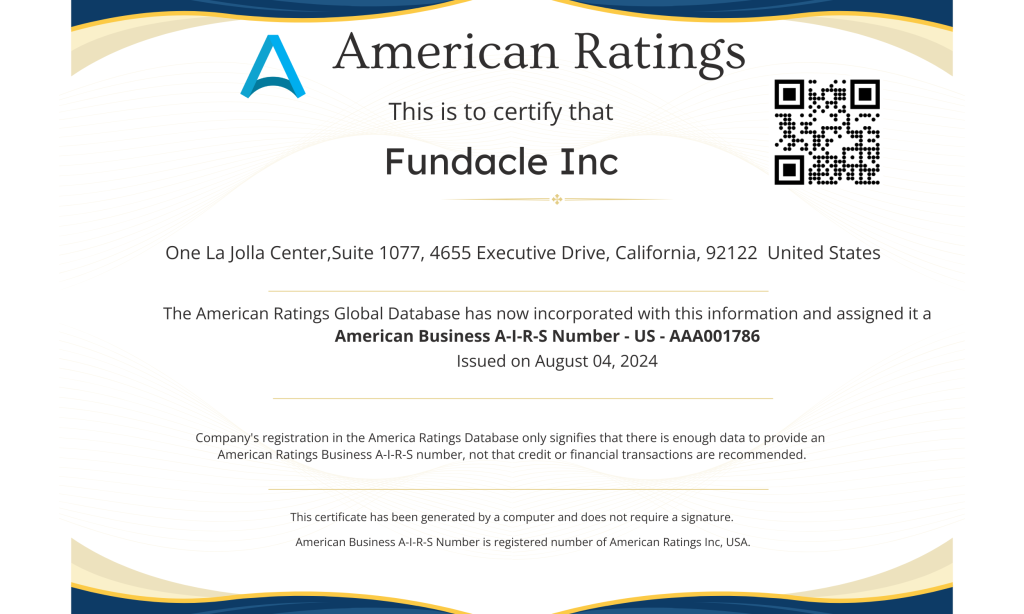
The Business A-I-R-S (American Industry Rating Standard) number is a specific code used to identify and track organisations across various systems and data. To find this number, you can:
- Contact American Ratings Inc. Directly:
- Reach out to American Ratings Inc. directly by contacting their customer service or administrative team to inquire about the A-I-R-S number.
- Use the American Ratings Website:
- Utilise the A-I-R-S Number Lookup tool on the American Ratings Website, which may require account creation or business information.
- Examine Official Documents:
- Review official documents, reports, or publications from American Ratings Inc. to locate the A-I-R-S number.
- Access the A-I-R-S Database:
- Utilize the A-I-R-S database or a directory that includes these identifiers to find information on American Ratings Inc.
- Consult Professional Associations:
- Check with professional associations to see if American Ratings Inc. is listed in any member directories that provide the A-I-R-S number.
The Data Universal Numbering System (DUNS) Number, created and managed by Dun & Bradstreet, is a global business identifier used for recognising entities. To find the DUNS number for American Ratings Inc., you can:
- Contact Dun & Bradstreet Directly:
- Their customer service or admin office should be able to provide their DUNS number.
- Use the Dun & Bradstreet Website:
- Utilize the DUNS Number Lookup tool on the Dun & Bradstreet website, which may require account creation or business information.
The Unique Entity Identifier (UEI) is a specialized code used to track organizations across various systems. The UEI system is essential due to:
- Standardization:
- Uniformity: Provides a consistent method for entity identification across systems.
- Efficient Data Sharing: Facilitates error-free data exchange between organizations.
- Transparency and Accountability:
- Monitoring: Enhances tracking and monitoring, especially for compliance.
- Audit Trails: Offers clear trails for transactions, increasing accountability.
- Operational Efficiency:
- Process Improvement: Streamlines administrative tasks like grants and procurement.
- Reduced Redundancy: Helps in minimizing record duplication.
- Security and Fraud Prevention:
- Identity Verification: Assists in confirming entity identities, reducing fraud risks.
- Secure Transactions: Ensures that transactions are conducted by legitimate entities.
- Interoperability:
- System Integration: Improves data integration across different systems.
- International Recognition: Ensures global visibility and traceability.
- Data Quality and Reporting:
- Enhanced Data Quality: Improves data reliability for better decision-making.
- Better Reporting: Supports comprehensive and accurate reporting.
UEI Applications:
- Government: For managing contracts, grants, and compliance.
- Nonprofits: To streamline grant applications and reports.
- Businesses: For procurement, partnerships, and regulatory compliance.
- Education: For research grants and collaborations.
Implementing UEI numbers significantly boosts operational efficiency, security, and transparency across sectors.
Credit Ratings in Business 2024: Credit ratings are crucial for businesses for several reasons:
- Capital Access:
- Financing Ease: High ratings facilitate easier access to financing at lower rates.
- Investor Attraction: Investors use ratings to assess company investment risks.
- Borrowing Costs:
- Lower Rates: Higher ratings usually lead to reduced interest rates.
- Favorable Loan Terms: Good ratings may secure better loan conditions.
- Confidence:
- Supplier Trust: Suppliers offer better terms to high-rated companies.
- Customer Assurance: Customers prefer businesses with strong ratings for stability.
- Competitive Edge:
- Market Position: High ratings enhance market reputation and competitiveness.
- Strategic Moves: Facilitates mergers, acquisitions, and expansions.
- Risk Management:
- Financial Health: Ratings aid in evaluating business stability.
- Insurance Costs: High ratings might lower insurance premiums.
- Regulatory Compliance:
- Industry Standards: Some industries require specific ratings for compliance.
- Investor Relations:
- Trust and Transparency: Strong ratings build investor confidence.
- Market Stability: Contributes to stock price stability.
- Mergers and Acquisitions:
- Deal Terms: Ratings impact merger and acquisition terms.
- Company Valuation: Higher ratings enhance valuation for potential buyers.
Maintaining a good credit rating influences financing options, borrowing costs, relationships, competitiveness, risk management, compliance, and investor trust. Strong ratings improve financial health and strategic prospects.
For your company’s credit ratings, visit the provided link or email support@statesratings.com.